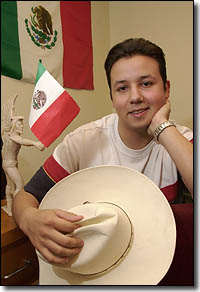Harvard Foundation honors students for improving racial climate

Racial harmony doesnt happen by accident on a college campus. It often takes hard work.
Sixteen students who have dedicated themselves to improving intercultural understanding and race relations at Harvard have been named recipients of the annual Harvard Foundation Awards. Eleven other students won honorable mention.
Sergio Castellon 00 was given the Foundations highest honor, the Directors Award, during the organizations annual banquet on April 27 at Quincy House.
“Each of the winners has done extra work around the College to improve race relations,” says S. Allen Counter, director of the Harvard Foundation. “In some cases, they may have detected some type of conflict, then immediately tried to work it out with peer counseling and discussions. You dont hear much about it because it doesnt make the news. Theyve taken care of it, and thats where theyre really making their great contributions.”
The winners were also cited for their work in planning a major panel discussion on hate crimes in America, involving several Harvard faculty members, and attended by about 500 students.
Counter commends Castellon, in particular, as “the one student who epitomizes what it takes to make a good community here [at Harvard].”
Breaking down the barriers
Castellon, a Mexican-American from the west side of Chicago, has worked as an intern for the Foundation for four years. During that time, he has also served as editor of Kaleidoscope, a monthly newsletter, and helped organize Cultural Rhythms, the Foundations annual cultural celebration. In addition, Castellon has taken an active role in Harvard Raza, an organization dedicated to promoting the Chicano cause, and Club Iberoamericano, an umbrella group dedicated to unifying Latino students at Harvard.
“One of the misconceptions is that all Latino people are the same, but in reality, there is a lot of division,” Castellon says. “Thats one of the problems [Club Iberoamericano has] identified, and we seek to slowly break down the barriers, through repeated interactions. The club hosts study breaks. We provide food. Whatever it takes to get people together and talk.”
Castellon, who is concentrating on economics at Harvard, believes establishing a dialogue between different ethnic groups is crucial when confronting the challenge of “bridging the gaps, not only among Mexican-Americans, but also between Mexican-Americans and Puerto Ricans, or Dominicans, or Cubans. Each group has its own cultural differences, goals, and aspirations. You just try to get everybody to keep talking.
“People wonder why there arent more Latinos voting, and why they dont have as much power as they should,” he explains. “One of the reasons is there are a large number of groups who each have their own peculiar aspects. We share a common language, but our agendas are often different.”
The number of Hispanic students at Harvard is relatively small, but Castellon believes that if they work together, they can become a powerful voice on campus. “We are a small minority here [at Harvard],” he says, “Youre never going to have everybody agreeing on everything all the time, but you can unify to a point where you can use it to leverage gains for the group as a whole.”
Promoting awareness of different cultures
The Harvard Foundation was established in 1981 by the President and Dean of the Faculty of Arts and Sciences as a means of improving the racial climate at the College by addressing the needs and concerns of minority students. During the academic year, the Foundation sponsors activities designed to promote awareness and appreciation of Harvards different ethnic cultures, while also providing grants for student projects.
This years Harvard Foundation award recipients are: Andrew Amo 01; Brian Scott Anderson 00; Daniel Brooks Baer 00, Adam Phillip Bailey 01; Ethel Billie Branch 01; Monique Shavonne Cofer 01; Jennifer Rene Darrah 01; Adeyemi Kwasi Delbridge 00; Mark Jorgensen Farrales 01; Sameera Fazili 00; Sakanya Lahiri 00; Ada Jane Maxwell 02; Lexer Indra Quamie 00; Oscar Ramos 01; Nina Sue Sawyer 01; and Serreyu Wong 01.
Adam Bailey, who is an active member of the Native American Program, says he got involved with the Foundation to expose himself to different cultures. “What really got me going during my freshman year was the fallout from the affirmative action debate,” he says. “Coming here, and working with the Native American Program, I saw there was a real need for inner-ethnic discussion and sharing of cultural values.
“I think thats what the Foundation does really well bringing different people in from all over the world to share their culture and their views about racial discussion and harmony. I think thats one of the most important things we can have [at Harvard],” Bailey says.
Monique Cofer is the Association of Black Harvard Women (ABHW) representative to the Foundation. “I think its important for all groups to have a support structure, and also to have a place where they can go to discuss issues that are important in the various communities,” she says. Cofer believes the Foundation serves a vital purpose by “honoring the contributions people have made, as well as making an active attempt to look after the welfare of the future of the community.”
Counter believes it is essential for the University to recognize Castellon and the other award winners.
“Harvard enjoys an excellent climate of inter-cultural and race relations, and we have come to take that for granted too often,” Counter says. “When you go to other places, you find that often the climate is not as positive as ours. My feeling is that we cant take these wonderful young people for granted.”




